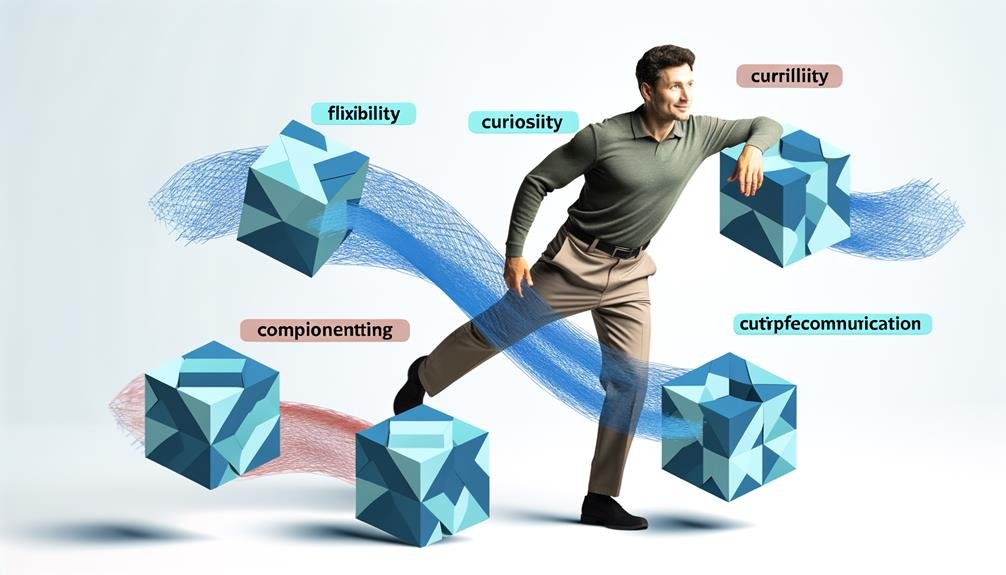Adaptable Leaders: Mastering Flexibility, Curiosity, Communication
In the realm of modern leadership, the ability to adapt and thrive amidst constant change is paramount. Adaptable leaders, equipped with a unique blend of flexibility, curiosity, and effective communication skills, are the linchpins of organizational success in today's turbulent times. Their capacity to navigate ambiguity with poise, foster innovation through a relentless pursuit of knowledge, and connect meaningfully with their teams sets them apart.
But what truly distinguishes these leaders in a world of rapid transformation? Let's explore the intricate dynamics of adaptable leadership and uncover the secrets that propel these individuals to excel in dynamic environments.
Key Takeaways
- Embrace flexible thinking and planning to adapt to changing situations effectively.
- Cultivate curiosity and continuous learning to foster innovation and growth mindset.
- Practice effective communication, resilience, and problem-solving for successful leadership.
- Encourage a culture of openness, creativity, and adaptability in the team for sustainable success.
Importance of Flexibility in Leadership
Flexibility in leadership is a paramount quality that enables leaders to navigate challenges with agility and adaptability, fostering resilience and innovation within their teams. The flexibility advantage allows leaders to pivot swiftly in response to changing circumstances, harnessing adaptability benefits to drive growth potential.
By embracing diverse perspectives and exploring alternative solutions, leaders can inspire creativity and motivate their teams to excel. This leadership impact not only nurtures a culture of continuous improvement but also instills a sense of confidence in the face of uncertainty.
Through flexible thinking and strategic planning, leaders can proactively address obstacles, leading their teams towards success in an ever-evolving landscape. In essence, flexibility in leadership is the cornerstone of effective management in today's dynamic world.
Cultivating Curiosity for Growth
Embracing a mindset of curiosity not only fuels personal growth but also cultivates a culture of continuous learning and innovation within leadership practices. Curiosity-driven innovation and growth mindset development are key elements in fostering leadership excellence.
Learning through exploration allows leaders to adapt to new perspectives, enabling them to stay ahead in a rapidly changing world. Encouraging curiosity not only sparks creativity but also instills a sense of adaptability within the team.
Power of Effective Communication
In the realm of leadership, effective communication serves as the cornerstone for building strong relationships and driving successful outcomes.
Understanding different communication styles and adapting them to various team dynamics is crucial for leaders.
Active listening plays a vital role in conflict resolution, enabling leaders to grasp diverse perspectives and facilitate constructive dialogue.
By clearly articulating goals and expectations, leaders can align their team towards a common vision.
Encouraging open communication channels fosters a culture of trust and transparency within the team.
Adapting communication styles to suit different audiences enhances comprehension and engagement.
Effective communication not only resolves conflicts but also strengthens relationships, boosts morale, and ultimately contributes to the overall success of the team.
Navigating Challenges With Resilience
Navigating challenges with resilience requires a steadfast commitment to facing adversity head-on, fostering a culture of adaptability and strength within the team. To overcome obstacles effectively, consider the following resilience techniques:
- Maintain a Positive Mindset: Cultivate optimism to see setbacks as opportunities for growth.
- Seek Support: Encourage open communication within the team to provide mutual assistance.
- Adapt and Pivot: Embrace change by being flexible in your approach and willing to adjust strategies.
- Learn from Setbacks: View failures as learning experiences, extracting valuable lessons to improve future outcomes.
Embracing Continuous Learning
With a commitment to lifelong growth and development, leaders cultivate a culture of continuous learning within their teams to drive innovation and adaptability. Embracing curiosity-driven growth and evolution is key to staying relevant in an ever-changing landscape. Leaders who encourage exploration and lifelong learning foster a dynamic environment where creativity flourishes, and new ideas emerge. By instilling a mindset of constant improvement and adaptation, teams become more agile and responsive to challenges. Embracing continuous learning not only enhances individual skills but also strengthens the collective knowledge base, enabling teams to navigate complexities with confidence. It is through this dedication to growth and exploration that leaders pave the way for sustained success and resilience.
| Lifelong Learning | Exploration | Curiosity Driven Growth |
|---|---|---|
| Develop new skills | Seek new opportunities | Foster innovation |
| Adapt to change | Experiment with ideas | Encourage creativity |
| Stay current | Embrace challenges | Cultivate a growth mindset |
Problem-Solving Strategies for Leaders
Building on the foundation of embracing continuous learning, leaders can excel in their roles by implementing effective problem-solving strategies that foster innovation and resilience within their teams.
To achieve this, consider the following:
- Encourage Creativity: Promote out-of-the-box thinking to discover innovative solutions to challenges.
- Embrace Failure: Cultivate a resilient mindset that views setbacks as opportunities for growth.
- Collaborative Problem-Solving: Foster a team environment where diverse perspectives contribute to effective solutions.
- Iterative Approach: Implement a continuous feedback loop to refine strategies and adapt quickly to changing circumstances.
Building a Culture of Adaptability
How can organizations cultivate a culture that embraces adaptability at its core, fostering resilience and innovation in the face of constant change?
Building an adaptability culture starts with nurturing a flexibility mindset within teams. Leaders play a crucial role in shaping team dynamics through their actions and decisions, influencing the overall adaptability of the organization. By demonstrating flexibility in approaches, encouraging open communication, and embracing change, leaders set the tone for a culture that thrives on adaptability.
This leadership impact trickles down to team members, empowering them to think creatively, embrace challenges, and adapt swiftly to evolving circumstances. Ultimately, fostering an adaptability culture not only enhances organizational resilience but also stimulates innovation and growth in today's dynamic business landscape.
Conclusion
In conclusion, adaptable leaders exemplify the virtues of flexibility, curiosity, and effective communication in navigating the complexities of today's business landscape. By embodying these essential traits, they are able to weather challenges, inspire innovation, and foster a culture of adaptability within their teams.
As Heraclitus once said, 'The only constant in life is change.' Adaptable leaders understand this fundamental truth and embrace it wholeheartedly, positioning themselves and their organizations for continued success in an ever-evolving world.






